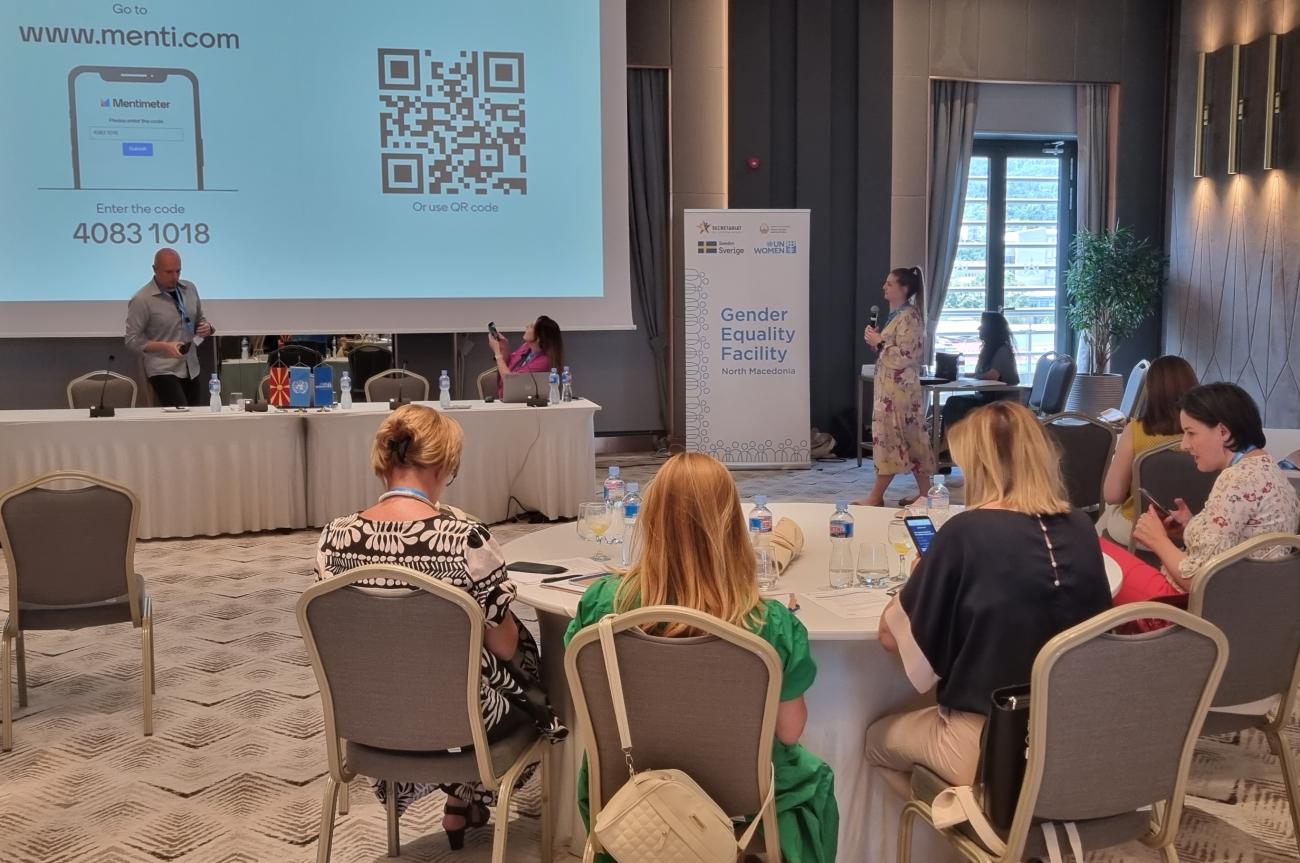Gender mainstreaming for EU-related reforms in North Macedonia

Why is gender mainstreaming important in the EU accession process for countries such as North Macedonia?
Gender mainstreaming is an important aspect that needs to be addressed in EU candidate countries during the accession process. Gender Equality is required by EU treaties and is a key principle under the European Pillar of Social Rights. The EU also aims to reach the target of gender mainstreaming in 85% of its external actions, making gender mainstreaming an explicit requirement and general obligation in EU accession and related reform processes.
To ensure this for North Macedonia, UN Women programme presence office partners with the Secretariat for European Affairs (SEA) and the Ministry of Labor and Social Policy of North Macedonia (MLSP), and also closely collaborates with the State Statistical Office, for the Gender Equality Facility (GEF) project. The project is implemented with the financial support from Sweden.
The project works at central level to increase long-term capacities and skills of key government personnel mandated for EU integration and gender equality, so gender equality goals are increasingly reflected in the country’s planning and policy processes.
In June 2022, UN Women North Macedonia organized a networking event under the title “Common steps towards advancing the Gender Equality Facility – GEF”. As a first large-scale gathering of key project stakeholders - members of sector working groups, the national IPA structures, gender equality coordinators, the Delegation of the European Union, and the Embassy of Sweden as project donor, the event offered space for dialogue and interactive sessions, focusing on how to achieve the project’s objectives through capacity building, knowledge products and networking.
The discussion also covered the challenges and possibilities of gender mainstreaming in the everyday operations of the public administration and the ways forward to improving the current state. More specifically, some of the conclusions, challenges and possible solutions voiced by participants were:
- There is a persisting need for gender equality to be pushed higher on the agenda and to be treated in a more systemic manner;
- Ongoing capacity building for the gender machinery in the country is prerequisite for a sustainable solution in gender mainstreaming;
- “Equal opportunities coordinator” should be introduced as a separate position within the systematization of the state institutions. As per the current situation, this is just an additional task for some of the existing staff, creating the risk of unstandardized effort among institutions and lack of sustainability;
- Relevant and continuous training as well as increased support and motivation for all stakeholders involved need to be offered;
- Gender data is of crucial importance, and all stakeholders need to be aware throughout their work on how to collect, analyze and use the data;
- Practical instead of just declarative support is needed, especially from the highest political echelon where decisions are being made.
The initial findings from two training needs assessment undertaken under GEF were also presented. Namely, the capacities assessment on gender mainstreaming in planning processes related to the National Programme for the Adoption of the Acquis (NPAA) has confirmed the need and specific knowledge gaps for the National Gender Mechanisms (Equal Opportunities Department and related Equal Opportunity Coordinators/Gender Focal Points) to advance administrative capacities for NPAA and to implement the EU Gender Equality legislation and policy in line with EU regulations and international obligations.
Secondly, the initial findings from the capacity assessment for gender mainstreaming in processes under the Instrument for Pre-Accession Assistance (IPA), confirm self-reported knowledge gaps on gender policies and gender mainstreaming, and a high interest for trainings on IPA processes among members of IPA units and Sector Working Groups.
The findings from the training needs assessments are guiding GEF’s further support to the Government of North Macedonia in transposing the EU Gender Equality acquis as part of the EU accession agenda. The project is also aimed at accomplishing gender equality outcomes in line with the 2030 Agenda and the Sustainable Development Goals, particularly SDG 5: Achieve gender equality and empower all women and girls.



